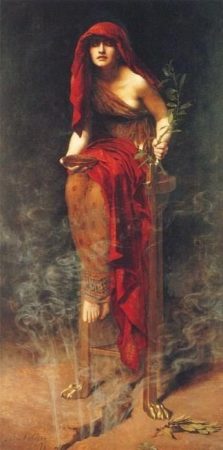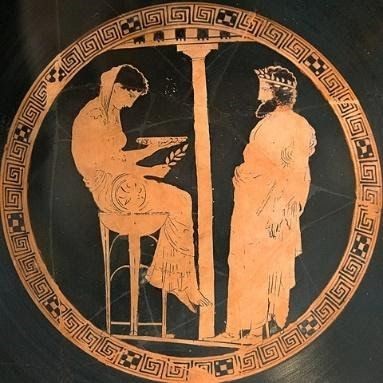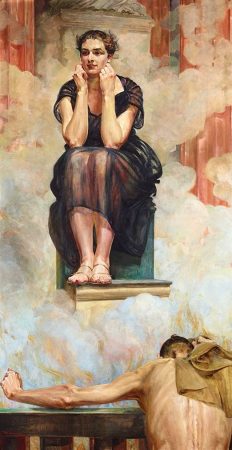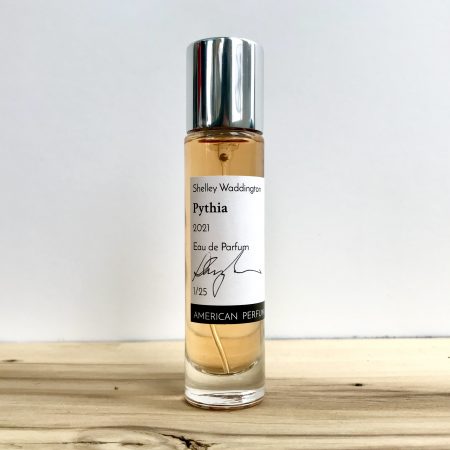
“Priestess of Delphi” by John Collier, 1891. via wikipedia
“Do you notice the brief waft of citrus as I breathe? The smell of roses on my veil? My hair carries the smell of sweet, intoxicating smoke from my inner chamber. My skin exudes the fragrance of my unguents made from ambergris and musk, sandalwood and civet, vanilla and balsams. I, Pythia, am the one and only source of the prophecies delivered here at Delphi. Delphi is the center of the world, and I am the center of Delphi.” ~ Shelley Waddington

Shelley Waddington photo courtesy of American Perfumer
Inscribed on the column in the forecourt of the Temple of Apollo: Know thyself. Nothing in Excess. Surety brings ruin. Gods, goddesses and dignitaries of the ancient world provide a fecund wellspring of inspiration and are so numerous that one need never exhaust the inventory. Award-winning perfumer Shelley Waddington of En Voyage Perfumes has looked to ancient history before to fuel her creative passions, prime examples being Nepenthe (Helen of Troy) and Makeda (Queen of Sheba). This time it is The Oracle of Delphi, The Pythia, which has captured the perfumer’s imagination – a compelling choice, as she was the most powerful woman in the classical world, occupying a most prestigious and privileged position.

image via wikipedia
The Pythia was the title accorded to the high priestess of the Temple of Apollo. In the male-dominated society which was ancient Greece, the advice most sought was that of the (female) oracle in Delphi – a city with a lengthy history of being considered the center of the world. According to Zeus, it was ‘the navel of Gaia’ (omphalos), the location once guarded by an immense serpent named Python who was slain on the very spot by infant Apollo’s arrows. Python’s corpse fell into a fissure from which great fumes were emitted as his carcass rotted. Any person who stood (or sat) over this opening was seen to fall into a violent trance state during which Apollo’s divine presence would possess them. Current day scientists theorize that the emission of a cocktail of carbon dioxide mixed with methane gas might be the cause of the Pythia’s psychic trances. Toxicity issues may have simply been due to a lack of oxygen in the Temple chamber, where air ventilation was poor and volcanic gases released from the soil were overpowering. Other scientists suspect that the oracles may have suffered from epilepsy (temporal lobe epilepsy seems credible, given symptoms of hearing voices, experiencing specific odors, etc.) Apollo’s sanctuary at Delphi was constructed in the 8th C. BCE; the final prophecy was uttered around 393 CE, at which time Roman emperor Theodosius decreed closure of all pagan holy places. The Pythia, vessel of Apollonian-divulged prophecy was originally a young virgin, but after the rape of a beautiful 3rd C. BC oracle it was decided that an older woman over 50 should ascend to the position, always dressed as a maiden (she was chosen after the previous Pythia died). Qualifying for Pythia necessitated that the candidate live a sober life, be a native of Delphi and possess a good character. If she was married, she would have to forsake her family, property and individual identity. Some were wealthy, from esteemed, educated backgrounds; some were simple peasants who were illiterate (Indeed, it has been suggested that an ignorant woman may have been preferable, as she would have been considered less of a political threat.). Aptitude seems to have been the prime criterion. The renowned Greek Middle Platonist historian, philosopher and biographer (Parallel Lives) Plutarch had great familiarity with the Pythia due to his service at Delphi as a priest during the last 30 years of his life. He believed that service to Apollo as one of the Pythia shortened existence because it was exhausting. She was often besieged by supplicants with concerns running the gamut from the petty to the fate of nations. At one point during the Classical Period there were three Pythia in place simultaneously at Delphi in order to fill the public’s needs. Her responses were frequently cryptic and veiled; it was incumbent upon the petitioner to listen and consider her advice very carefully (thus rendering the Pythia’s decrees irrefutable).

Jacek Malczewski Pytia, 1917. Wikimedia
After the oracle observed her obligatory rituals (bathing in the Castalian Spring, drinking water from a holy river, sacrificing a goat and descending into the inner sanctum below the Temple known as the adyton), she seated herself upon a covered tripod cauldron in the omphalos at the Temple’s center, directly above a fissure from which sweet acrid gaseous vapors emanated. This is the moment which perfumer Shelley Waddington aims to encapsulate for Pythia for American Perfumer. Shelley Waddington Pythia for American Perfumer commences with lemon and the floral herbalcy of rosemary, a very natural and unaffected opening which is charming and fleeting; it feels appropriate set in the historical period and locus, consummately Greek. The rose which follows creates a bridge between the tonic topnotes and base-centric foundation of the fragrance (and as you know, rose is the Universal Playmate). The base is all sweet eddying smoke and conjure – Pythia’s possession, as it were – evocative of animal burnt sacrifice (civet and musk), a slight salinity (ambergris), and sacred woods and resins aflame to smoldering, sooty and sugar-dusted. Pythia for American Perfumer is a powerful and tenacious scent with significant longevity; the drydown is lovely. Perfumer Shelley Waddington has breathed new life into mythic history.
Notes: lemon, rosemary, rose, vanilla, civet, ambergris, musk, sandalwood, balsam
Sample provided by Dave Kern of American Perfumer – many thanks! My nose is my own.
~ Ida Meister, Deputy Editor and Natural Perfumery Editor

Shelley Waddington Pythia for American Perfumer
Editor’s Note: Shelley Waddington Pythia for American Perfumer was one of the limited editions created solely for the retailer American Perfumer. All 25 signed bottle, which were sold through a lottery and have been sold out as February 27, 2021. These limited editions created solely for Dave Kern of American Perfumer include Madame Chouteau by Shawn Maher, (which received a CaFleureBon Best of Scent 2020), Hans Hendley Bloodine (also a CaFleureBon Best of Scent 2019) among other notable perfumes. Colorado by Dawn Spencer Hurwitz won an Art and Olfaction Award Winning fragrance -Michelyn
Thanks to the kindness of Dave Kern of American Perfumer we have one sample for one registered reader in the USA ONLY. You must register here. To be eligible, please tell us what you enjoyed most in Ida’s review of Shelley Waddington Pythia for American Perfumer. Which AMERICAN artisan perfumer would you like to see collaborate with American Perfumer? Draw closes 3/8/21
This is our Privacy and Draw Rules Policy
Please follow us on Instagram @cafleurebon @idameister @theamericanperfumer @en_voyage_perfumes
We announce the winners only on our site and on our Facebook page, so like ÇaFleureBon and use our blog feed … or your dream prize will be just spilled perfume.
